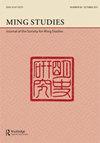Share and Rule: Intellectual Origins of the Early Ming (1368–1644) Princedoms
IF 0.3
0 ASIAN STUDIES
引用次数: 2
Abstract
In the early Ming (1368-1644), the founding emperor Zhu Yuanzhang (朱元璋, 1328-1398, r. 1368-1398) established more than twenty princedoms across the empire. Scholarship to date has generally emphasized the continuance of the Yuan (1271-1368) institutions into the early Ming. Apart from the endurance of Yuan legacy, this article addresses how Zhu Yuanzhang ideologically framed and justified the establishment of princedoms. By showing the possible influences of Southern Song (1127-1279) statecraft traditions on early Ming legislation, this article argues that Zhu Yuanzhang sought to construct the enduring system of government by drawing on the classic model of “divide and rule,” as suggested in the Confucian Classics. In their turn, the literati who advised Zhu Yuanzhang in the making of the Ming empire sought to secure their own realms of autonomy and influence in local society by upholding the fengjian doctrine and presenting themselves as the later counterparts of the ancient feudal vassals who “shared” in the governance of their country and “ruled” on behalf of their emperors.分享与统治:明初(1368-1644)王族的知识起源
明初(1368-1644),开国皇帝朱元璋(朱元璋, 1328-1398年,1368-1398)在整个帝国建立了20多个公国。迄今为止,学术界普遍强调元(1271-1368)的制度延续到明初。本文除了论述元遗风的持久性外,还论述了朱元璋是如何从思想上为建立太子制度进行界定和论证的。本文通过考察南宋(1127-1279)治国传统对明初立法的可能影响,认为朱元璋试图借鉴儒家经典中的“分治”模式来构建持久的政体。反过来,为朱元璋建立明朝帝国提供建议的文人们,则试图通过坚持奉简学说,并将自己塑造成古代封建诸侯的后来对等者,从而确保自己在地方社会中的自治和影响力,这些封建诸侯“共治”国家,代表皇帝“统治”国家。
本文章由计算机程序翻译,如有差异,请以英文原文为准。
求助全文
约1分钟内获得全文
求助全文

 求助内容:
求助内容: 应助结果提醒方式:
应助结果提醒方式:


